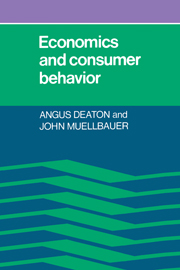Book contents
- Frontmatter
- Contents
- List of tables and figures
- Preface
- PART ONE CONSUMER DEMAND ANALYSIS
- 1 The limits to choice
- 2 Preferences and demand
- 3 The theory at work
- 4 Extensions to the basic model
- PART TWO SEPARABILITY AND AGGREGATION
- PART THREE WELFARE AND CONSUMER BEHAVIOR
- PART FOUR EXTENSIONS AND APPLICATIONS
- References
- List of notation
- Name index
- Subject index
2 - Preferences and demand
Published online by Cambridge University Press: 05 June 2012
- Frontmatter
- Contents
- List of tables and figures
- Preface
- PART ONE CONSUMER DEMAND ANALYSIS
- 1 The limits to choice
- 2 Preferences and demand
- 3 The theory at work
- 4 Extensions to the basic model
- PART TWO SEPARABILITY AND AGGREGATION
- PART THREE WELFARE AND CONSUMER BEHAVIOR
- PART FOUR EXTENSIONS AND APPLICATIONS
- References
- List of notation
- Name index
- Subject index
Summary
In Chapter 1, we assumed without justification the existence of demand functions. We provide a basis for that assumption in this chapter by considering individual preferences. In so doing, we seek not only to describe rather more completely the properties of demands but also to establish a framework within which we shall operate for the rest of the book. Section 2.1 discusses the axioms of choice and how they lead to utility functions and to the system of choice described by utility maximization. Section 2.2 is concerned with the transition from utility to the demand functions; the traditional constrained maximization approach is discussed and its drawbacks enumerated. Section 2.3 presents consumer demand in terms of cost minimization rather than utility maximization. Marshallian uncompensated demand functions, defined on prices and outlay, are contrasted with Hicksian compensated demand functions, defined on prices and utility, and the central concept of the cost function is introduced. Section 2.4 uses the apparatus of cost minimization to derive the properties of demand. Symmetry and negativity (the “law of demand”) are presented as is the Slutsky equation linking the price derivatives of compensated and uncompensated demands. The generality of these results is contrasted with those obtained through more traditional approaches. Section 2.5 is concerned with the meaning of “duality” in consumer theory, and we show how the cost function can be used as an alternative to the utility function as a representation of preferences.
Information
- Type
- Chapter
- Information
- Economics and Consumer Behavior , pp. 25 - 59Publisher: Cambridge University PressPrint publication year: 1980
Accessibility standard: Unknown
Why this information is here
This section outlines the accessibility features of this content - including support for screen readers, full keyboard navigation and high-contrast display options. This may not be relevant for you.Accessibility Information
- 1
- Cited by
